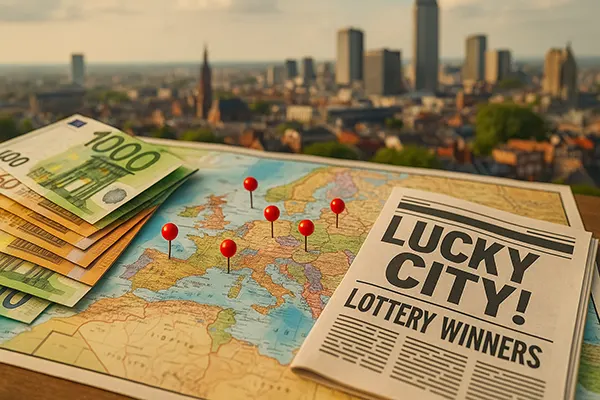Do “Lucky” Cities and Regions for Lottery Wins Really Exist?

The idea that certain places bring better fortune in the lottery has fascinated players for decades. From towns that frequently appear in jackpot news to regions where people seem to buy more tickets, speculation never ends. But is there any truth behind the notion of “lucky” cities and regions, or is it simply a matter of probability and human perception?
The Myth of Geographical Fortune
Stories about “lucky towns” often begin when multiple large lottery prizes are sold in the same area within a short time. Newspapers highlight such coincidences, fuelling the belief that certain places are luckier than others. However, statisticians remind us that probability is random, and clustering of wins can happen purely by chance.
For example, in the United Kingdom, towns such as Romford or Newcastle have occasionally been spotlighted for producing several winners in a short span. In Spain, the El Gordo Christmas lottery often creates clusters of winners in the same city, as syndicates or groups buy entire blocks of tickets. These cases highlight distribution patterns rather than genuine geographical fortune.
Mathematically, every ticket has the same chance of winning regardless of location. What makes some places appear luckier is often the higher number of tickets sold there, combined with media attention when jackpots occur in succession.
Why Some Areas Appear Luckier
The perception of “lucky” regions is strongly tied to population density. Large urban centres sell more lottery tickets, which statistically increases the likelihood of winners emerging from these places. London, Madrid, and Berlin frequently make headlines, not because they are luckier, but because millions of tickets are bought there every week.
Another factor is community-based play. In Spain’s El Gordo, entire towns participate collectively, meaning a single jackpot can spread across hundreds of residents. This creates the illusion of an extraordinarily fortunate location, even though it is just coordinated purchasing.
Finally, media reporting reinforces the myth. Stories of multiple wins in a small area are exciting, while equally random wins spread across villages or suburbs rarely make the news. This selective coverage strengthens the belief in geographical luck.
Statistical Patterns in Lottery Wins
When reviewing official lottery statistics across Europe and North America, a consistent pattern emerges: larger cities produce more winners. This is not due to fortune, but to sheer sales volume. For instance, in the EuroMillions, most jackpot-winning tickets in the past five years came from France, Spain, and the UK—countries with the highest participation rates.
In the United States, states like California and Florida frequently top the charts for Powerball and Mega Millions winners. Again, the reason is straightforward: these states have bigger populations and higher ticket sales compared to smaller states such as Vermont or Wyoming.
Researchers analysing lottery distribution data confirm that once population and ticket sales are considered, the probability of winning is evenly distributed across all regions. There is no scientific evidence that certain places possess inherent luck.
Examples from 2025 Lotteries
Recent draws illustrate these patterns clearly. In January 2025, a £42 million EuroMillions jackpot was won in Manchester, leading to headlines about a “lucky northern city.” Yet lottery authorities pointed out that the city’s high participation rate naturally increases the chance of producing winners over time.
Similarly, in March 2025, several winning El Gordo tickets were sold in Zaragoza, again suggesting a “lucky city.” In reality, this was the result of coordinated community syndicates, which purchased large sets of identical numbers.
Across different countries, the recurring theme is the same: clusters of winners can occur anywhere, but they reflect participation volume rather than mystical geographical fortune.

The Psychology Behind the Belief
Humans are naturally inclined to search for patterns, even in random events. This cognitive bias explains why the idea of “lucky cities” is so persistent. People feel more confident buying tickets in places with a history of winners, even though their odds remain unchanged.
Lottery operators sometimes amplify this perception by publishing maps of winning regions. While the intention is often to celebrate winners, it also fuels the belief that certain towns are “hotspots.” This encourages more purchases in those areas, creating a self-reinforcing cycle.
Another psychological factor is the personalisation of chance. People are more likely to remember stories of winners from familiar towns or neighbouring regions, which reinforces the impression that some places are luckier than others.
Responsible Perspective on Lottery Luck
Understanding that lottery outcomes are random is essential for responsible play. While stories of lucky towns make entertaining news, they should not influence purchasing decisions. Every ticket, no matter where it is bought, carries exactly the same odds of winning.
Players should also be aware that focusing on geographical fortune can create unrealistic expectations. Believing in “lucky cities” may lead to overspending or misplaced confidence, which goes against responsible gambling principles.
The healthiest approach is to treat the lottery as a form of entertainment, not a guaranteed path to wealth. Recognising the role of probability over geography helps maintain realistic expectations and ensures that participation remains enjoyable rather than problematic.
